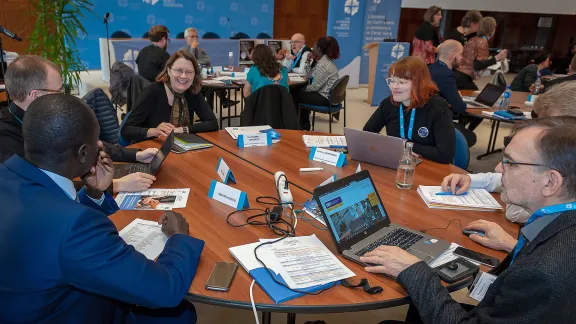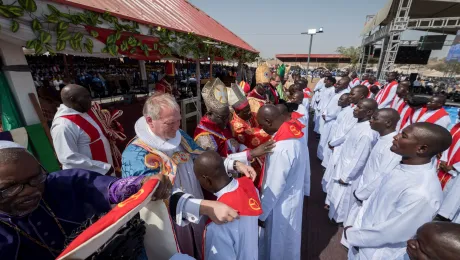
Participants at the Working Together meeting in Geneva. Photo: LWF/S. Gallay
LWF member churches and related organizations gather in Geneva for annual ‘Working Together’ meeting
(LWI) - Representatives of a dozen member churches and related organizations of the Lutheran World Federation (LWF) have been meeting in Geneva to discuss ways of strengthening their partnerships to provide more effective support for programs in countries across the globe.
Since its founding, the LWF has relied on the partnership and generous financial support of these groups, who meet each year to discuss the joint work and upcoming priorities. At the top of the agenda at the 28 February to 1 March meeting was a discussion of the new LWF strategy and plans to implement it at local, national and international levels.
Hands-on work with marginalized groups
Among those attending the meeting was Sieglinde Weinbrenner, a Human Rights Consultant with Bread for the World, the global development and relief agency of the Protestant churches in Germany. Her organization has been a partner of the LWF for decades and currently cooperates on development and advocacy work in more than seventeen countries.
Weinbrenner says the LWF plays a vital role because of its “hands-on work with some of the most marginalized groups like refugees and other minorities, especially in areas where it is difficult for others to have access” such as Somalia, or Myanmar’s Rakhine State. Alongside this humanitarian work, she says, the LWF also plays a key role as a communion speaking out for justice, especially in today’s world where the Human Rights framework is increasingly being sidelined. “We would like to see this role strengthened more”, she says, particularly regarding LWF’s ability to promote dialogue around the theology of gender justice.
Pia Kummel-Myrskog, head of Church Cooperation with FELM, an agency of the Evangelical Lutheran Church of Finland, also highlights the LWF’s “strong focus on gender theology and justice”, as well as its vital work on climate justice. No church or organization can tackle these issues alone, she says, but “the critical mass is really changing attitudes here.”
Strengthening churches’ contribution to SDGs
FELM is supporting three main areas of LWFs work in theological education, leadership training and capacity building – especially through ‘Waking the Giant’, the LWF’s global ecumenical initiative designed to build the capacity of churches to contribute effectively to the 2030 UN Agenda for Sustainable Development. Kummel-Myrskog notes there are concerns about finding better ways of reporting and presenting this valuable work, which is not always well known or appreciated at local or international level.
Among the member church representatives attending the meeting was Stig Lundberg, from the Church of Sweden’s International Department which has a close relationship with LWF. Historically, he says, the LWF has played a key role in developing relationships with the United Nations in Geneva, but also with the ecumenical world through the World Council of Churches and its close contacts with the Catholic church.
Bridge-building in the global south
“Looking at today and in the future”, he continues, “the LWF could be even more of a bridge builder and hub for communication and contacts between member churches,” not only between north and south, but especially between churches in the global south. He gives an example of where he saw this role in action recently during a trip to Nigeria in December to visit the ‘Symbols of Hope’ program. “I could see how important it was to have a representative from Ethiopia who came to Nigeria to learn and share and exchange with them”, he says, urging the LWF to develop this role further.
The LWF could be even more of a bridge builder and hub for communication and contacts between member churches
Also attending the Working Together meeting was Rebecca Duerst, Director for Diakonia in the global mission unit of the Evangelical Lutheran Church of America (ELCA). She notes that the ELCA works “across the board with all LWF departments” but also supports many of its member churches in some 77 countries worldwide.
Communicating the sense of service
She sees the work of this partnership as more important than ever before, particularly in the current political climate where nationalist agendas are making “people fold in on themselves”.
Duerst says she sees “the purpose of the church’s work, especially Diakonia that I lead, is to make sure that we’re retaining instead an outward focus, both in proclamation and in service”. This diaconal work, she concludes, is especially important because of “what it communicates about how we understand who God is, and what it means to be in service to one another”.


